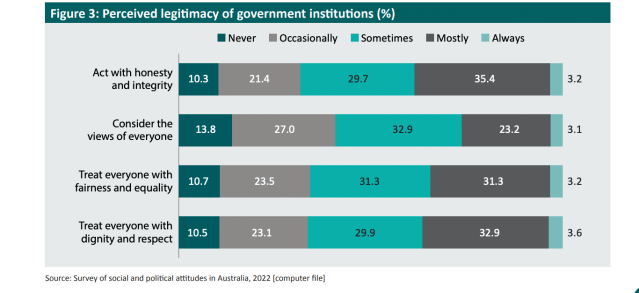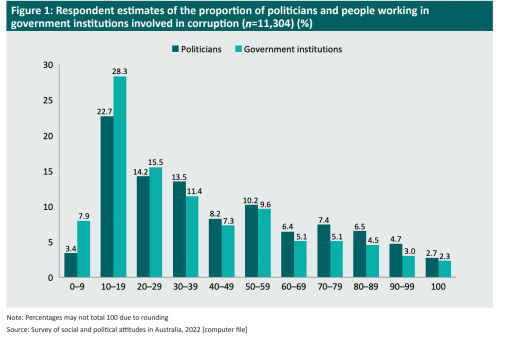A third of Australians think more than 50 per cent of those working in government institutions are involved in corruption, according to a survey by the Australian Institute of Criminology.
Researchers surveyed more than 11,300 Australians about their perceptions of corruption among public officials in late 2022, ahead of the opening of the new National Anti-Corruption Commission last July.
The survey showed 29.6 per cent of respondents believe more than half of Australia’s government institutions are involved in corruption.
Thirty-eight per cent said they believed more than half of all politicians were involved in corruption.
Younger, unemployed and First Nations respondents believed there were higher levels of corruption, along with respondents with lower levels of education and those in socio-economically disadvantaged areas.
Approximately one-third of respondents believed representatives of government institutions either ‘never’ or only ‘occasionally’ act with honesty and integrity, consider the views of everyday citizens , treat everyday citizens with fairness and equality, or treat everyday citizens with dignity and respect .

The researchers note that perceptions of corruption in the public sector tend to be disproportionate to the actual occurrance of corruption.
In 2021–22, 138 APS employees were found to have breached their Code of Conduct, and in the 2022 APS Employee Census, three per cent of employees reported that they had witnessed another public service employee engage in potentially corrupt behaviour. Less than one per cent of Australians had personally observed corrupt behaviour among public officials.
Globally, Australia is among the least corrupt nations according to the Corruption Perceptions Index which measures of perceived public sector corruption across 180 countries and territories

However, perceptions of corruption tend to be different, the researchers say.
In a 2012 survey, the federal government was rated as corrupt by 32 per cent of respondents. In a survey of 1,204 Australian adults conducted as part of the 2020 Global Corruption Barometer, two-thirds of respondents believed that corruption was a problem in government.
There are equally poor perceptions of the ability of both Commonwealth and state and territory governments to handle corruption.
The researchers say the current study underscores the need for strong and visible anti-corruption measures in government, as perceptions of corruption were associated with diminished levels of perceived legitimacy of public officials.
“Perceived corruption and the legitimacy of public officials go hand in hand. Implementing measures to address one may help improve the other,” the paper says.
The paper, authored by Alexandra Voce, Anthony Morgan and Timothy Cubitt, acknowledges that the survey took place while the Robodebt Royal Commission was holding public hearings.





Leave a Reply